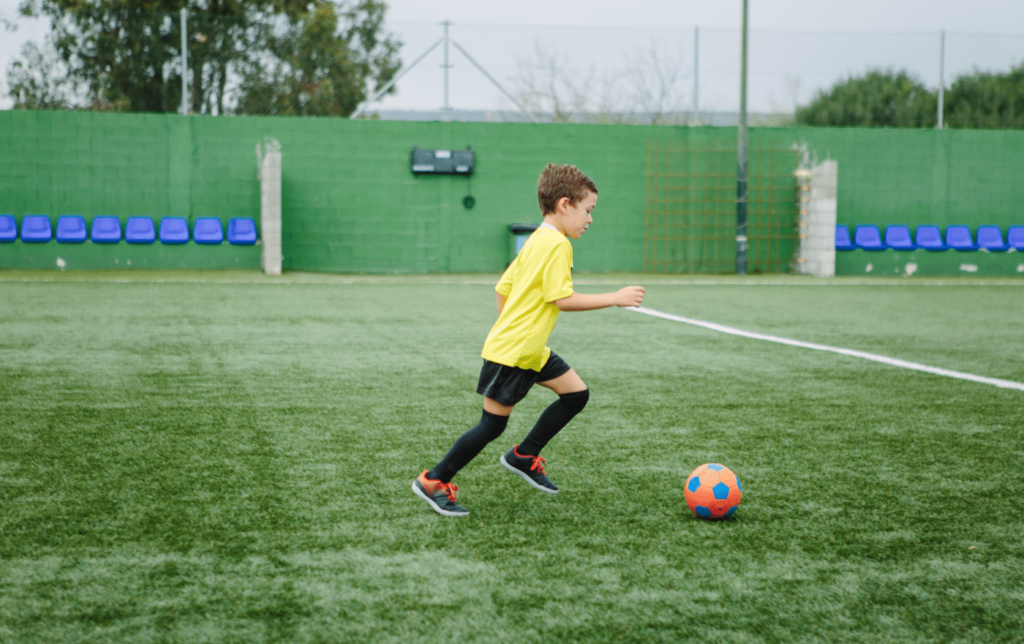How to find the right summer sport for your kids

Everything you should consider, from your child’s skills to your schedule and more
There are many excellent reasons for your child to play sports over the summer, ranging from their need for exercise to your need for child care, from the life lessons they will learn to the fact that sports are (or should be) fun.
Now is the time to start planning summer sports for your kid(s), as registration often opens a few months before activities begin (i.e., right about now).
So what should you consider when helping your child pick an activity, from safety to your offspring’s interests and ability? To find out, we asked Justin Cannon, program director of the Austin branch of i9 Sports, a national organization that runs community-based kids’ sports leagues, clinics and activities for some advice.
In this article:
The basics
How to look for options
In terms of finding something suitable for your offspring, “your friends and your kids’ friends’ parents are usually the best resources,” says Cannon.
“For example, if your son is into soccer, ask if anyone else’s kid has played somewhere.” Beyond that, “programs often promote themselves inside schools,” he says.
There are a few national organizations that facilitate local, zip code-based searches, such as Soccer Shots, USA Sport Group and i9, but Googling for things in your area will also yield results that won’t show up on those national sites.
How to assess safety
All sports camps, clinics or classes “should be background checking their coaches and staff,” says Cannon. “That’s a given, and you’d be hard pressed to find anybody that doesn’t do that.”
This means, of course, that if you do encounter an organization that doesn’t do such checks, don’t entrust them with your child.
“Outside of that, the other thing is making sure the safety protocols make sense for the program,” says Cannon. For example, “protocols are much different in a program format where the parents are there the whole time,” versus one where they aren’t. If parents aren’t present, make sure the staff to child ratio is adequate. The American Camp Association has its preferred ratios here.
The cost
Be aware that costs can vary widely, especially once you add gear and clothing.
“For our programs, we try to pull out what’s necessary for equipment, meaning we provide practice soccer balls, for example. All of our programs are non-contact, so you’re not buying helmets or anything like that,” says Cannon.
“But when you look around the country at other programs, it’s all over the place,” with varying costs for uniforms and equipment.
When considering price, also take into account transport and other indirect costs, like snacks or lunch at a restaurant if the facility is a long way from your home.
The climate
Traditional summer sports like tee ball tend to take place outside, so you should factor in what the weather is like in your neck of the woods. “We’re in Texas, so most of our summer stuff is indoors or done before noon because of the heat,” says Cannon.
Warm weather might also add cost, if you factor in sunscreen, bug spray and the like. It can also add inconvenience, if you’re at the mercy of rain or storms. An indoor sport like basketball might be worth considering, though the tradeoff is missing out on spending time in the great outdoors on nicer days.
Never mind your child: What about your needs?
As the parent, you’ll be responsible for schlepping your kid to and from practices and games, procuring the necessary uniforms and/or equipment, and generally keeping track of schedules and coordinating plans. If you’re not on board with this, it will make everything that much harder.
So make sure you know what you need out of this. Do you need a day camp where your child will be effectively watched all day while you’re at work? Do you need something with a short journey from your home?
You want to choose something your child will stick with, yes. But you need to stick with it too, so be realistic about what’s manageable for you and your family.
You might also like

Life insurance is a smart move when you have people in your life who depend on you financially.
Read more
Your child
Skill level and seriousness
For all the usual reasons of nature and nurture, some kids have more of an aptitude for sports than others. Maybe you put a ball glove in your kid’s hand on their first birthday. Maybe your kid has never so much as watched a sports highlight on TV. Maybe your kid’s friends play soccer during recess, or flag football during P.E.
Maybe you just don’t know how your kid will do, in terms of skill, fitness level, and just paying attention.
“Parents have a general idea if their kid’s athletic or not, just from playing on the playground or messing around,” says Cannon, and that should be sufficient for making decisions about what level of exertion will suit them.
That said, “it’s our belief that the focus really needs to be on learning development and a multisport approach until a kid is about 13,” says Cannon.
“Studies show that starting kids with sport too early and too seriously leads to burnout. We partnered with the U.S. Olympic Committee and we’re pushing an athletic development model similar to some of the Norwegian models where it’s very recreational until 13. The percentage of Norwegian kids participating in sports is 93%; in the US it’s 50-something.”
Sports activities that are structured but don’t necessarily involve teams and leagues and serious competition are often known as “clinics,” where there’s an emphasis on fun as well as children “leaving better than they were when they arrived,” says Cannon.
But what about younger children who still want to play at a high level? “Red Sox player Nomar Garciaparra once talked about this: he said you’ve got to be really careful when the kids say, ‘I love doing this.’
“Because if they said they love eating cake it doesn’t mean you’d feed them cake every day,” he says. “Kids love it until they don’t: They don’t understand that they’re creating stress. So it’s the parents’ responsibility to make sure that the kids are not overdoing it.”
Keep in mind that even if — maybe especially if — you think your kid is a budding Tiger Woods or Serena Williams, it might be worth taking a step back and thinking things through a little bit so you don’t add pressure to their lives.
“Youth sports originally was about fun and now it’s turned into a ladder towards professionalism or college scholarships,” Cannon says. “At the end of the day, you’re either going to be big, strong and fast or you’re not, so when kids are younger, it’s better to focus on sports as life lessons: How to be a teammate, how to be a leader, how to win, how to lose, learning how to fail, learning accountability. You know, that to me is the importance of sports for children.”
“When kids are younger, it’s better to focus on sports as life lessons: How to be a teammate, how to be a leader, how to win, how to lose, learning how to fail, learning accountability. That is the importance of sports for children.”
—Justin Cannon, program director, Austin branch of i9 Sports
Starting age
Kids can start doing sports as young as 3 years old, but the structure (and amount of structure) will be very different for a preschooler than it will be for a 10-year-old.
If you have children of different ages it may be attractive (and convenient) to put them in the same place, but make sure that age-appropriate instruction is available for both of them.
Structure
If you want your child’s sports experiences to be mainly recreational, Cannon suggests looking for a situation where they practice and play on the same day.
“We do not run programs where you just practice during the week [but don’t play actual games during those sessions],” he says, “and the reason is that we are we think kids are overscheduled and that the majority of their playtime is structured and organized and led by adults. So we try to forward the idea that sports are part of your life, but they’re not dominating it.”
Unenthusiastic children
While the above covers kids who want to play sports in the summer, what about those who don’t, but maybe should? What are the strategies for getting your sports-reluctant child to get into it?
“Our programs are seven weekends long,” says Cannon, so the commitment is not huge. “My advice to parents is to have their kids try something that won’t last for too long, and if they don’t like one sport, try another.”
“Also, just because they didn’t like something at five years old, doesn’t mean they won’t want to try it again at eight,” he adds. “There’s a big social element to sports that parents have to realize. You know, playing with your friends is fun. If your kid’s best friend at school is playing basketball, the next thing you know, your child who wasn’t interested before now wants to try it.”
Picking a sport
If your child isn’t excited about sports, or doesn’t know what they’d like to try, you can help guide them towards something enjoyable by considering a few points.
Does your child do better in individual or group situations? If the latter, they might enjoy team sports like basketball. If the former, maybe tennis or archery would be better. That said, if your child is more of a lone wolf and you think it would be good for them to play more with others, some team sports over the summer could be a good way to encourage that.
Is your child high energy? If so, a sport with a lot of standing around and finesse such as golf might be less satisfying than something like soccer, where they will constantly be running. However, you might choose a more low-energy sport for a child who needs to sharpen their concentration, or a high energy one for a kid who could benefit from being less sedentary.
Does your child like watching sports? If so, you’ve got a good clue to what they might like to try right there, even if you might have to think creatively. If your kid is into Formula 1, is there a Go Kart option near you?
What haven’t they played? The American Academy of Pediatrics suggests that kids should avoid sport specialization, and summer is a great time to try a new sport, just for fun. If your child is on the hockey team, for example, encourage them to try basketball or another different sport.
There are also ways to sample sports without signing up for a commitment. For example, the local climbing gym might have a family day where you can try it out for free or little cost. Mini golf is not golf, but a round of putt-putt might show whether your kid has the patience for the real thing.
In praise of not organizing
“One thing I’d say, and this is as a person that runs organized sports, is that kids need to learn to play in a non-organized environment,” says Cannon.
“So play with your kids in the neighborhood: it doesn’t have to be a program that you go and pay money for and requires a uniform and plays against other teams. Just go play and see if they like it. That’s the most fun.”
And really, isn’t that what it’s all about?
Our editorial policy
Haven Life is a customer-centric life insurance agency that’s backed and wholly owned by Massachusetts Mutual Life Insurance Company (MassMutual). We believe navigating decisions about life insurance, your personal finances and overall wellness can be refreshingly simple.
Our editorial policy
Haven Life is a customer centric life insurance agency that’s backed and wholly owned by Massachusetts Mutual Life Insurance Company (MassMutual). We believe navigating decisions about life insurance, your personal finances and overall wellness can be refreshingly simple.
Our content is created for educational purposes only. Haven Life does not endorse the companies, products, services or strategies discussed here, but we hope they can make your life a little less hard if they are a fit for your situation.
Haven Life is not authorized to give tax, legal or investment advice. This material is not intended to provide, and should not be relied on for tax, legal, or investment advice. Individuals are encouraged to seed advice from their own tax or legal counsel.
Read more
Our disclosures
Haven Term is a Term Life Insurance Policy (DTC and ICC17DTC in certain states, including NC) issued by Massachusetts Mutual Life Insurance Company (MassMutual), Springfield, MA 01111-0001 and offered exclusively through Haven Life Insurance Agency, LLC. In NY, Haven Term is DTC-NY 1017. In CA, Haven Term is DTC-CA 042017. Haven Term Simplified is a Simplified Issue Term Life Insurance Policy (ICC19PCM-SI 0819 in certain states, including NC) issued by the C.M. Life Insurance Company, Enfield, CT 06082. Policy and rider form numbers and features may vary by state and may not be available in all states. Our Agency license number in California is OK71922 and in Arkansas 100139527.
MassMutual is rated by A.M. Best Company as A++ (Superior; Top category of 15). The rating is as of Aril 1, 2020 and is subject to change. MassMutual has received different ratings from other rating agencies.
Haven Life Plus (Plus) is the marketing name for the Plus rider, which is included as part of the Haven Term policy and offers access to additional services and benefits at no cost or at a discount. The rider is not available in every state and is subject to change at any time. Neither Haven Life nor MassMutual are responsible for the provision of the benefits and services made accessible under the Plus Rider, which are provided by third party vendors (partners). For more information about Haven Life Plus, please visit: https://havenlife.com/plus
Read our disclosures
You might also like




Get our most-read stories, twice a month
Pros:
-Easy online application
-Can get coverage immediately after applying online
-Pretty seamless process throughout the experience Cons:
-Although told I was covered initially after applying online, I was informed that I needed to get physical check up in order to continue the plan.
-Although I’m very healthy, my plan price increased 2x after the physical checkup.
Applying for life insurance in your 40’s is exhausting!! But at least Haven made it as easy as possible! Everything is efficiently handled through email. Communication is excellent, they give updates all along the way. Scheduling the bloodwork is easy and convenient. Plus, the rate was better than other companies. Easy to sign off on paperwork.
The application was easy to complete and the rate quoted was very competitive. The amount applied for required an examination and that process was very convenient, efficient, flexible, and the medical professional was friendly and capable. The policy approved was exactly as quoted with an option to add to the amount originally applied for and I took advantage of the offer. Haven Life is a subsidiary of MassMutual, one of the highest rated companies in the insurance industry. I couldn’t be happier!
I shopped around for a few weeks before finding Haven Life. They made the application process very easy, and I was thrilled with the competitive rate they offered.
The folks at Haven Life were so response and helpful during my application period. They were also warm and kind.






